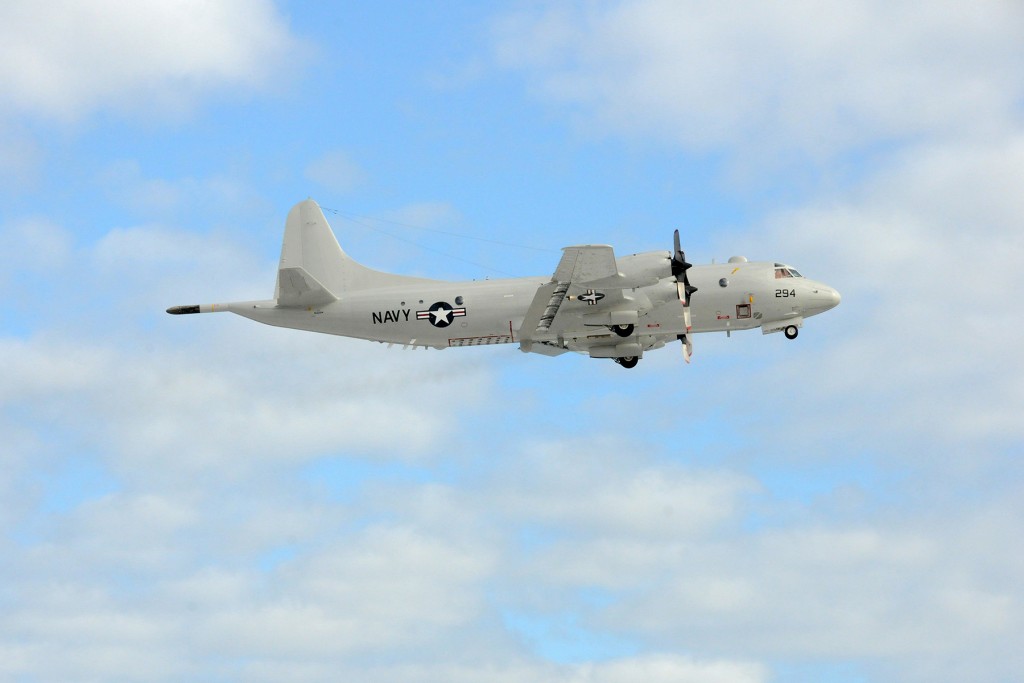
The US Navy has deployed a long range P-3 Orion surveillance plane to help search for the wreckage of the EgyptAir flight that crashed into the Mediterranean on May 19, 2016, officials said. “US Commander Sixth Fleet is working with the Joint Rescue Coordination Center in Greece and the US Defense Attache in Athens, Greece to provide US Navy P-3 Orion support in the search of the missing Egyptian aircraft,” the Navy said in a statement./ AFP PHOTO /
by Samer al-Atrush with John Hadoulis in Athens
CAIRO , Egypt (AFP) — A massive search was under way Thursday for the wreckage of an EgyptAir plane that plunged into the Mediterranean with 66 people on board, in what the Egyptian authorities said may have been an act of terrorism.
Egypt’s aviation minister said that while it was too soon to say why the Airbus A320 flying from Paris to Cairo had vanished from radar screens, a “terrorist” attack would be a more likely scenario than a technical failure.
The tragedy raised fears of a repeat of the bombing of a Russian passenger jet by the Islamic State (IS) jihadist group over Egypt last October that killed all 224 people on board.
The plane disappeared between the Greek islands and the Egyptian coast overnight, without its crew sending a distress signal.
Greek Defense Minister Panos Kammenos said the aircraft had swerved sharply twice in Egyptian airspace before plunging 22,000 feet (6,700 meters) and disappearing from radar screens.
Both Egypt and Greece dispatched aircraft and naval vessels on a major search mission. They were expected to be joined by French teams, while the US send a surveillance plane to help with the operation.
Egypt’s President Abdel Fattah al-Sisi demanded an “intensified search” for the aircraft after reports that wreckage from the plane had been found were retracted.
EgyptAir initially said on its Twitter account that the Egyptian authorities had recovered wreckage from the missing aircraft No. MS 804 near Greece’s Karpathos Island.
But the head of the Greek air safety authority, Athanasios Binis, told AFP that debris found close to the area where the jet went down did “not come from a plane”, a finding he said was confirmed by his Egyptian counterpart.
EgyptAir Holding Company vice president Ahmed Adel then corrected his company’s statement, telling CNN that the debris that was spotted was “not part of our plane”.
French President Francois Hollande said the plane had “crashed”, as authorities in both Paris and Cairo opened investigations.
In the United States, White House spokesman Josh Earnest said “it’s too early to definitively say what may have caused this disaster”.
Egypt’s Aviation Minister Sherif Fathy said he was unable to “deny the hypothesis of a terrorist attack or something technical”.
The airline said 15 French citizens were among the 26 foreign passengers on the plane, who also included a Briton and at least one Canadian.
Both France and Egypt have come under attack by IS jihadists in the past year, and Hollande promised a comprehensive probe into the cause of the crash as suspicions swiftly focused on a bomb.
“Whether it was an accident or another hypothesis that everyone has on their mind — a terrorist hypothesis… at this stage we must focus on our solidarity with the families and the search for the causes of the catastrophe,” he said.
No distress call
IS has been waging a deadly insurgency against Egyptian security forces and last October claimed the bombing of the Russian airliner flying home holidaymakers from the Egyptian resort of Sharm El-Sheikh.
A Greek aviation source said the flight had disappeared from Greek radar at around 0029 GMT.
“It crashed around 130 nautical miles off the island of Karpathos,” the source told AFP, referring to an island northeast of Crete.
Greek civil aviation chief Constantinos Litzerakos said the pilot had mentioned no problem in the last communication before the plane disappeared, and it had not deviated from its course.
“The flight controllers contacted the pilot (with the plane) at a height of 37,000 feet (near Athens)… he did not mention a problem,” Litzerakos told Greece’s Antenna TV.
Neither the Greek coastguard nor the navy could confirm reports that a passing ship had seen “a ball of fire in the sky”.
The civil aviation chief said if there had been an explosion, any debris would have scattered across a wide area.
EgyptAir’s Adel also said there had been “no distress call” before the plane vanished.
Two babies
The passengers also included two Iraqis and one citizen from each of Algeria, Belgium, Chad, Portugal, Saudi Arabia and Sudan, as well as 30 Egyptians, the airline said. They included a boy and two babies.
Seven crew members and three security men were also on board.
EgyptAir said the plane had been manufactured in 2003. Airbus said it had clocked up 48,000 flight hours.
EgyptAir hit the headlines in March when a flight from the coastal city of Alexandria to Cairo was hijacked and forced to divert to Cyprus, where the hijacker, who was described as “unstable”, demanded to see his ex-wife.
He had claimed he was wearing an explosive vest, which turned out to be fake.
Last October, foreign governments issued travel warnings for Egypt and demanded a review of security at its airports after IS downed the Russian airliner with what it said was a bomb concealed in a soda can that had been smuggled into the hold.
burs-dv/mfp
© 1994-2016 Agence France-Presse








